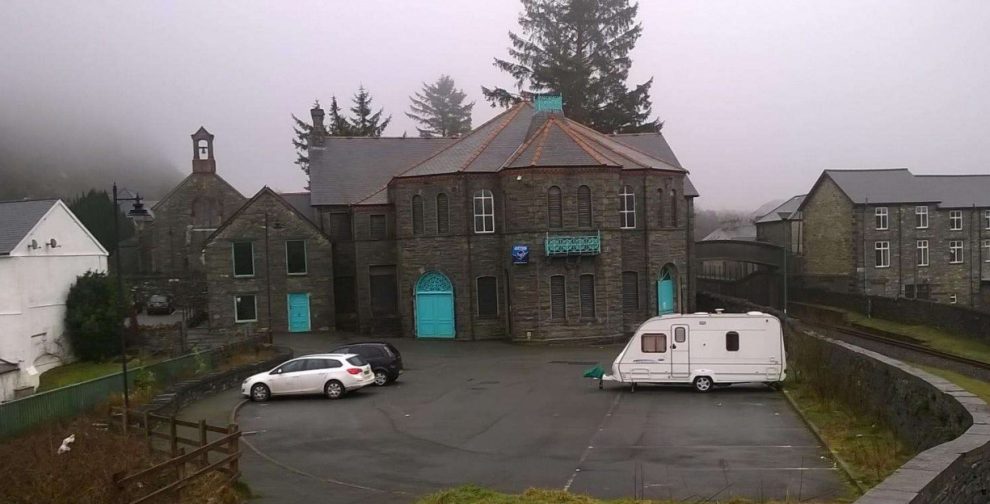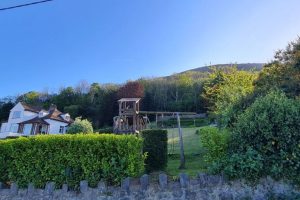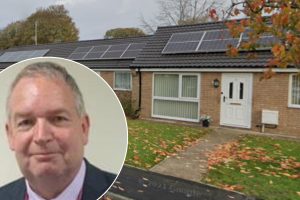PLANS to build 14 flats at market hall where Welsh Prime Minister David Lloyd George gave his first political speech have been rejected.
The application to convert the Market Hall on Church Street, Blaenau Ffestiniog, was turned down by Cyngor Gwynedd’s planning committee, on Monday, June 16.
The plans were submitted by Paul McCready of Mossley Hill Investments Gwynedd Ltd to develop eight one-bedroom, and six two-bedroom flats.
Plans had first been submitted in February 2019, and deferred in July 2019, after more information was requested by the council’s language unit, with some amended details supplied in 2020.
However, in June 2021, the building was given Grade-II listing by Cadw.

Due to elapsed time, planners had sought updated information, to assess the application against recent planning policy, but no response had been received, planning officer Keira Ann Sweenie said.
“Despite officers’ efforts there’s been no progress,” she told the meeting.
It was felt the developers had “had enough time” and the recommendation was to refuse, based on lack of recent information and being unable to assess the application against recent policy.
Developers had initially wanted to provide supported living accommodation, in partnership with MySpace Housing Association, but had acknowledged in a report this had “raised community concerns”.
Those concerns had mainly been about the “supported living” aspect attracting “outsiders”, which it was feared could “worsen existing anti-social behaviour issues within the community”.
Having “taken regard to the concerns” the developers had hoped amended plans for 14 self-contained, “open market” apartments, in lieu of managed rentals, would be “received favourably” by the community.
“The provision of one and two-bedroom apartments increases choice for smaller families, young couples or households of older people,” they had stated, adding they could help meet “an identified demand” for smaller housing units.
It would also ensure the empty building would avoid falling into disrepair, “and prevent it from becoming a draw for anti-social behaviour” they had argued.
The application had prompted Ffestiniog Town Council objections, with members concerned t it was “not a development for local needs”.
“If there is no local demand for one-bedroom flats, then this may be a threat to the area’s language and community,” it said.
It was “not in support” due to “no consideration” of the Welsh language and parking issues, including the needs of the Church.
It also raised concerns about bats, but had received no response.
The report noted the Housing Strategic Unit felt there was “some demand” for one- and two-bedroom affordable flats, but no formal valuation was submitted.
The Language Unit said there was a “lack of clarity” in the plans, and could not support the view there was “no likely language impact”.
A member of the public had objected, saying the site should not be used due to its history, parking, and “pressure on the community and the Welsh language” based on a “danger that more people would move in”.
The Gwynedd Archaeological Planning Service felt the building was of “historic interest” having been constructed between 1861-1864, by Owen Roberts, of Dolgareddu and designed by Owen Morris, of Porthmadog.
Although of “no exceptional architectural value” it had “historical importance” due to links to the 19th century when the town was flourishing, and as the place where David Lloyd George had spoken.
A diary, held by the National Library of Wales, describes how the building was where he gave his first political speech, on February 12, 1886.
Local member Cllr Elfed Wyn Ap Elwyn had “concerns,” based on local views, and those of the community council, particularly over parking and worries over the impact on the Welsh language.
Local people also had “strong feelings” to protect the historic building.
Due to a lack of current information, planning officers felt there was “no option” but to recommend refusal.
Cllr Anne Lloyd Jones proposed rejecting based on lack of information, seconded by Cllr Edgar Wyn Owen, a view supported by other councillors. The application was refused.














